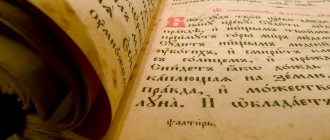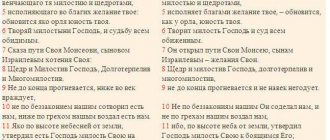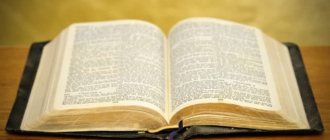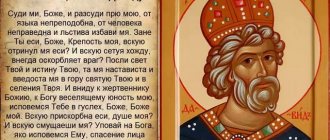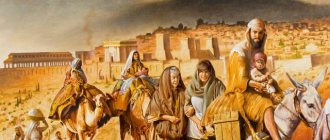Text of prayer Psalm 57
The song itself is written in Hebrew. Then, over time, it was translated into Greek. After Orthodoxy reached Rus', the text was translated, but into Church Slavonic. It is still performed in this language in churches during services to this day. It is believed that this option brings a person closer to God. But not everyone is able to understand its meaning. Therefore, there is a version translated into Russian. You can get acquainted with each one and accept the appropriate prayer for yourself below.
In Old Church Slavonic
In Russian
History of creation
David was a simple shepherd who lived in humility and kindness. The king of Jerusalem named Saul was known as an evil man, which is why the Lord turned away from him and chose David for himself. The king, jealous of the fact that the mercy of the Almighty was now with an ordinary person from the people, decided to destroy him.
David lived in persecution for several years, and each time miraculously escaped death. And all because he was certainly faithful to God, and the Lord protected him throughout his entire life. In a state of despair and fear of death, Psalm 57 was written, where the future prophet trusts in God’s mercy and support in all his endeavors. This prayer is like a cry from the soul that breaks far, far away in the hope of being heard.
History of writing a prayer
Many art historians share the same opinion: most of the hymns of thanksgiving and petitionary songs from the biblical book of Psalms belong to the pen of the prophet David. Psalm 57 refers specifically to such songs.
Most of the songs from the book of Psalms were written by the prophet David
The text was written on the verge of despair of the author, as evidenced by the line “Do not destroy!” King Saul could not resist his own feelings of envy. Led by evil spirits, he began to persecute David. Saul was torn by hatred, anger and envy. He could not accept that a humble and young youth was anointed by the Lord God to the kingdom. Persecution, slander and hatred from Saul and those around him forced the singer to flee. The future prophet was forced to hide in a desert area, where he began to write a prayer book.
The texts presented in the holy book differ in genre. Thus, verses 6 and 50 refer to prayers, 43 and 101 to heartfelt speeches, 105 to historical events. As for Psalm 57, the prayer text seems too intolerant and cruel. Art historians equate it with the curses that overwhelmed David at the very beginning of his flight.
Why read Psalm 57
Psalm 57 is usually read at church services. It is part of the 8th kathisma and is read in those cases when it is necessary to expose obvious offenders and present them to the sight of the Lord.
Psalm 57 is a prayer that helps perfectly in certain cases. Usually it is read in order to drive enemies away from oneself and make them obvious, so that the Lord himself judges them according to His law. Such prayer brings peace to the souls of believers and frees a person from lynching on his part.
Text of Psalm 57 in Russian
1 To the director of the choir. Don't destroy it. Scripture of David.
2 Do you, O judges, speak the truth, and judge justly, O sons of men?
3 You form iniquity in your heart; you put on the scales the iniquity of your hands on the earth.
4 From birth the wicked have departed; from the womb they have gone astray, speaking lies.
5 Their poison is like the poison of a snake, like a deaf adder that stops its ears
6 and does not hear the voice of the spellcaster, the most skilled in spells.
7 God! break their teeth in their mouth; Break, Lord, the jaws of the lions!
8 Let them disappear like running water; when the arrows are strained, let them be as broken.
9 Let them disappear like a snail opening; let them not see the sun, like a woman's miscarriage.
10 Before your cauldrons feel the burning thorns, let both the fresh and the burnt be carried away by a whirlwind.
11 The righteous will rejoice when he sees vengeance; He will wash his feet in the blood of the wicked.
12 And the man will say: “Surely there is fruit for the righteous! So there is a God who judges on earth!”
Psalm 57 is filled with despair and hopelessness, while literally every line is imbued with hope and faith in the Almighty. And, as you know, sincere prayer can work miracles.
If you find an error, please select a piece of text and press Ctrl+Enter.
Interpretation of Psalm 57
In the verses of the psalm you can see all the despair, all the pain that David put into every line. The future king was born at a time when the human race was going through difficult times in its history. There were wars, poverty, devastation all around. People starved, lived for survival and, as a result, became angry with each other, becoming like animals.
The fugitive had always been sensitive, so this darkness stained his soul as well. At some points the verses seem angry, but it is worth understanding that David is a victim of unfounded slander, insults and accusations.
Nothing and no one will escape God's judgment; everyone will be judged according to general laws. Sinners will receive what they deserve, but the righteous will be forgiven and accepted by the Lord into His kingdom.
Verse 1-3. Here David describes his enemies. Moreover, David did not do anything bad, but as it turns out, the enemies are constantly pursuing us. And no matter how righteous David was, their ultimate goal was to destroy his world order and faith in God.
Verse 4-5. For David, this attitude was comparable to a stab in the back. Liars and conspirators are presented in these lines as snakes - a symbol of cunning and betrayal, a symbol of the devil.
Verse 6-9. Realizing that he was left alone and no one would help him, David asks for help from God as the last bastion of protection and support. In these lines, hatred disappears. Here the crying of a tired person comes to the fore, praying to the Lord to solve his problems and take the right path.
Verse 10-11. Here we observe how the saved and renewed David thanks the Almighty for his blessings and makes a vow to praise Him as the intercessor of the righteous and pious.
Interpretation and main idea of the psalm
The main idea of 57 songs from the book of Psalms is despair from hopelessness and simultaneous faith in the Lord God.
Many Christians consider this prayer appeal too difficult and difficult to understand. When writing the text, the author used very harsh statements. For example, the third line of the verse is dedicated to denouncing the “judges,” whose plans are full of deceit and hypocrisy. Some art critics draw an analogy with the betrayal and unfair trial of Jesus Christ. The sentence against the Son of God, like the false witness against David, was unjustly imposed.
In the last lines, the author calls on the Almighty for help. He asks for protection for himself and other believers from misfortunes, slanderers and sinners.
Reading rules
They read the prayer in church, but you can also read it at home. For home reading, the text adapted to the Russian language is suitable. You should pray exclusively in front of the icon. In this way, your thoughts will be directed towards dialogue with God, your heart will open, and worldly problems will fade in comparison with the greatness of the Lord. Be assured that real sinners will be punished if you ask Him for it. You should not turn to the Almighty about petty quarrels. Perform prayer only when you feel unjustly deceived or slandered.
Publication by the successors of A.P. Lopukhin. Explanatory Bible. Interpretation of the Psalter
| SEARCH | FORUM |
Psalm 57
The psalm was written by David during the preparations for Absalom’s uprising, when he could observe in Jerusalem both the degree of bitterness of his enemies against him (vv. 4-5), and the beginning of disorder in life: they (the enemies) abused their power.
You judges act unjustly because you always commit atrocities (2-3). These judges are wicked, from birth they love evil and are incapable of rebirth, just as an asp is incapable of spells (4-6). Destroy, O Lord, their power, make them harmless and dispel them (7-10). Then the righteous will rejoice from the knowledge that there is a God who judges on earth! (11-12)
1 To the director of the choir. Don't destroy it. Scripture of David. 2 Do you, O judges, speak the truth, and judge justly, O sons of men?
2. It is known that Absalom tried to win over the Jews by pointing out the injustices that David allegedly allowed due to his inability to govern the people and his dislike for the latter. Since Absalom's insinuating speeches had their effect, the popularity of him and his supporters grew, while David's influence declined. Power, thus, actually and gradually passed to the side of unrecognized and illegitimate rulers. How the latter conducted business will be clarified further.
3 You form iniquity in your heart, you put on the scales the iniquity of your hands on earth.
3. “To form iniquity in the heart” - to love and nourish evil, to be internally disposed towards evil. “Put evil deeds on the scales” - tip the scales of justice, outweigh evil deeds. An evil case in court decisions depends on the leadership in the analysis of litigation not on the substance of the act, but on extraneous considerations, such as, for example, bribery. Bribery, as a dishonorable deed and atrocity, tipped the scales of the judge.
4 From birth the wicked have departed; from the womb they have gone astray, speaking lies. 5 Their poison is like the poison of a snake, like a deaf asp who stops his ears 6 and does not hear the voice of the exorcist, the most skilled in spells.
5-6. The depravity of these new judges is so great that they are inaccessible to the perception of what is good and honest. They are like snakes, like an adder, which is not influenced by the best spellcasters of the East, who, through whispering and whistling, could so charm the most poisonous of them that they became powerless to bite.
7 God! break their teeth in their mouth; Break, Lord, the jaws of the lions!
7. “Crush teeth, break jaws” - take away what makes predatory animals especially strong, that is, take away the power of the wicked to cause harm.
8 Let them disappear like running water; when the arrows are strained, let them be as broken. 9 Let them disappear like a snail opening; let them not see the sun, like a woman's miscarriage.
9. “Let them disappear like a blossoming snail,” which, as it emerges from its shell, becomes defenseless not only from animals or birds, but even from insects. - “Let them not see the sun, like a miscarriage” - let their influence not become stronger, have no success and predominance, like a stillborn is harmless.
10 Before your cauldrons feel the burning thorns, let both the fresh and the burnt be carried away by a whirlwind.
10. The destructive effect of the wicked is compared to a cauldron in which food is usually boiled. To warm the cauldron, you need material, especially dry thorns and dry brushwood. This dry or burnt thorn is the evil desires of the wicked. To the extent that these aspirations find application and actual expression in actions, the cauldron heats up and the number of disasters they cause increases, David prays to the Lord not to give the wicked the power and opportunity to cause harm, but to dispel them.
11 The righteous will rejoice when he sees vengeance; He will wash his feet in the blood of the wicked.
11. “He will wash his feet in the blood of the wicked” - the image is taken from military operations, when the earth is stained with the blood of defeated and persecuted enemies, along which (the earth) their conquerors are chasing them. The meaning of the expression is: let the wicked perish and the righteous remain victorious.
12 And the man will say: “Surely there is fruit for the righteous! So there is a God who judges on earth!”
12. The death of the wicked will strengthen in people the consciousness that “there is a God who judges on earth!”, which will encourage them to adhere to the truth and fight against wickedness, expecting protection and reinforcement from God, who is watching over the earth.
